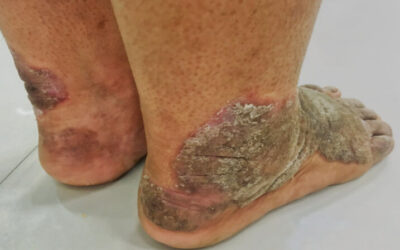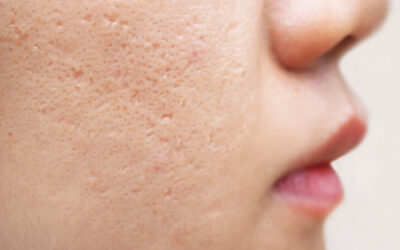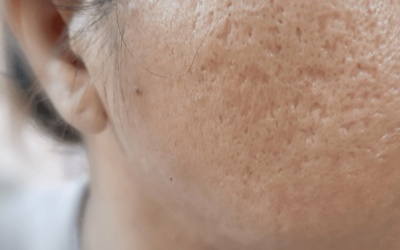Getting dry hands occasionally is common. It is not a serious condition, but it can be annoying and even painful when it starts to crack, or worse, peel. Dry hands and cracked skin are even more concerning when you try everything you can to get rid of the dryness but they still stay the same.
What causes dry hands?
There are many causes of dry hands and it is important to determine what caused yours so you can identify how to treat them.
Aging
The older you get, the thinner, less flexible and supple your skin becomes. This is because the oil production in your skin lessens and this is why you may notice more dryness and more lines on your skin as you age.
Weather
Cold and dry weather is also a common culprit for dry hands. Your skin needs moisture to keep the skin barrier strong and healthy. However, the low humidity in the air during colder weather draws moisture from your skin resulting in dry hands.
Hand-washing woes
Washing your hands is important to prevent many kinds of illnesses, but constant hand-washing can strip your skin of its natural oils. This leads to drier hands.
Harsh soaps and sanitizers
Harsh soaps and sanitizers can also affect your skin barrier because it pulls the oils and moisture from your skin. To maintain healthy skin, stick to mild soaps and moisturizing sanitizers instead.
Eczema
Eczema or atopic dermatitis is a condition that causes redness, dryness, and irritation to the skin. It damages the skin barrier function, thus giving you more sensitive skin. Although common and not contagious, it can be very uncomfortable. To get proper treatment for eczema, it is important to consult a certified eczema specialist or dermatologist.
Symptoms Of Dry Hands
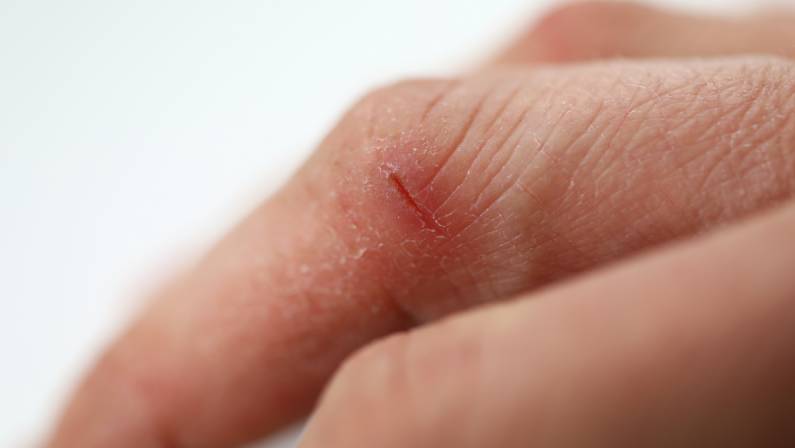
Dry hands can look different from person to person.
Here are some of the most common symptoms of dry hands:
- A feeling of skin tightness, especially after showering, bathing, or swimming
- Skin that feels and looks rough
- Chronic itching
- Slight to severe flaking, scaling, or peeling of your hand skin
- Fine lines or cracks
- Gray, ashy skin
- Redness
- Deep cracks that may bleed
How to treat dry cracked hands?
Prevention is always better than cure. However, not everyone can control the factors that can affect or trigger dry skin. This is why you need to learn how to heal dry, cracked hands at home.
If you have dry or cracked hands, there are still many things you can do to treat them.
Here are some of the best cracked, dry hands remedies.
1. Moisturize
Apply moisturizer or lotion all over your hands (and your body) several times a day to make up for the lack of moisture in your skin. There are many moisturizing creams and lotions to choose from, but make sure you get one that is specifically formulated to treat dry skin.
For better and faster results, get a heavy-duty moisturizer.
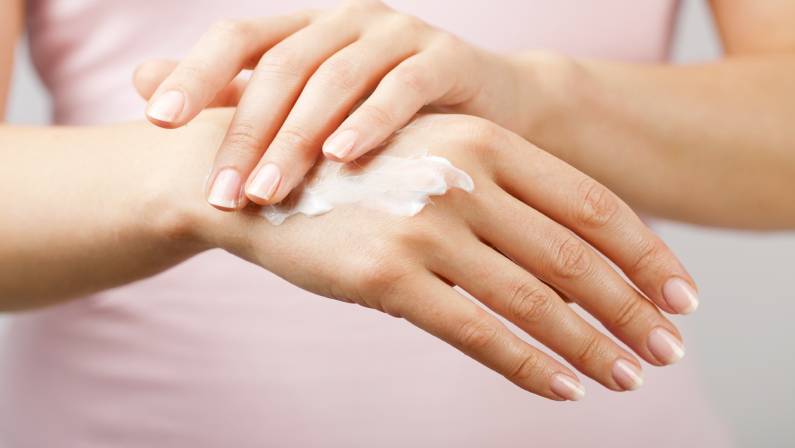
2. Wear gloves
If the weather is affecting the skin on your hands, protect it by wearing gloves. This keeps your hands from the harsh winds or the cold temperature that triggers dryness of the skin.
Gloves are also helpful when you find your hands always in contact with water. Washing dishes, for example, can strip your hands of its natural oils so a pair of gloves should help prevent that.
3. Decrease stress
Did you know that stress is actually a trigger for eczema? When your body produces more cortisol than usual, it suppresses your immune system and triggers inflammation which could manifest as skin dryness or eczema.
Keep your stress levels in check to avoid health problems such as that of the skin.
4. Apply aloe vera
Aloe vera is popular for its natural moisturizing and anti-inflammatory properties. This makes it the perfect natural treatment for dry skin. It can even be used on chapped lips or dry hair.
To treat the dryness and cracks on your hands, simply apply aloe vera gel all over clean hands. It is best to apply it right after showering to lock in moisture better.
5. Use gentle soap
Many soaps in the market strip your skin off its natural oils so it is best to stick to gentle and moisturizing soap when you have dry skin.
6. Consider medication
Not all cases of dry skin require medication. However, if you are suffering from severe eczema, certain medications can be taken to help relieve your symptoms. Talk to your doctor or a certified dermatologist for a prescription. They may prescribe topical steroids or oral antibiotics depending on the severity of your condition.
7. Ask your doctor about UV light therapy
UV light therapy or phototherapy is a treatment that helps speed up the process of healing your skin. Basically, it reduces inflammation and increases the healthy production of skin cells. This is usually considered for severe medical conditions such as psoriasis, so it is best to talk to a dermatologist before trying any form of UV treatment.
8. Treat them overnight
Slather your hands with heavy-duty moisturizer, lotion or hand cream, and wear gloves or socks over them. Leave the moisturizer overnight and let it work its magic. For most cases, this should help your hands regain or lock in moisture so you can wake up with smoother and more hydrated hands.
9. Ask about prescription cream
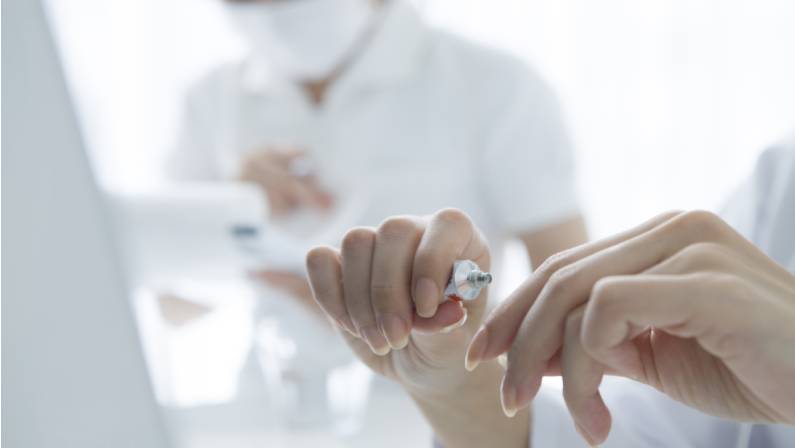
There are prescription topical creams your doctor can prescribe for your dry hands. These special moisturizing creams or lotions can contain lactic acid or urea that helps heal dry and scaly skin.
10. Apply hydrocortisone cream
Hydrocortisone creams reduce inflammation in your skin. They are also usually thicker and greasier than your ordinary moisturizer so they can make better treatments for dry and flaky skin.
11. Use a wet dressing
Cracks in your dry hand need to heal properly first before you can do anything to treat the dryness. Talk to your dermatologist about this and they may recommend that you use a wet dressing or a liquid bandage over the cracks for better healing.
12. Use a humidifier
A humidifier is especially helpful for preventing and treating dry and itchy skin. When humidity is low in the air, your skin gets drier and sometimes itchy. You can regulate the humidity and save the loss of moisture from your skin by using a good humidifier.
How to prevent dry hands
While you can always purchase products to treat your dry hands or consult your dermatologist for prescriptions, it is still important to prevent dryness in the first place.
Be mindful of what comes in contact with your skin such as harsh chemicals, soaps, and even water. Apply lotion or moisturizer to your hands even when you don’t find them dry so you can keep them supple and prevent moisture loss.
When should you seek treatment for dry cracked hands?
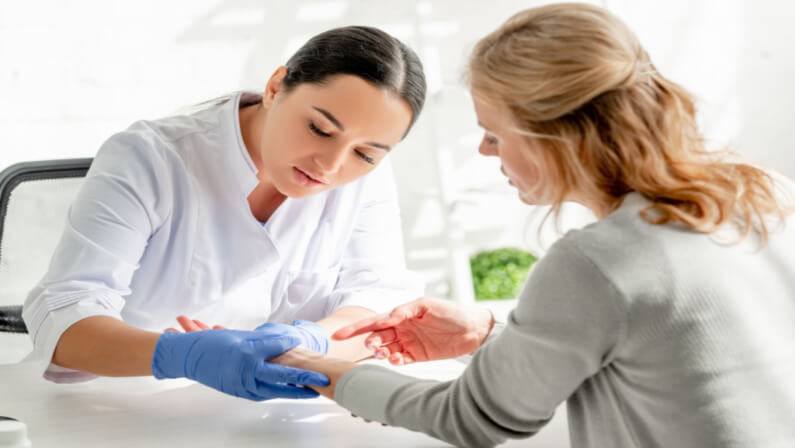
Dry, cracked hands are a nuisance. It’s not only unpleasant to look at, it can also feel itchy and painful. Severely dry, cracked hands are even worse. When you see cracks on your hands, redness, or even itchiness that won’t go away, visit a dermatologist immediately for early treatment or diagnosis for any medical condition your dry skin is signaling.
It is important to consult a dermatologist and skin expert to understand the causes of your skin condition and get advice on what helps dry hands. Early medical advice or diagnosis is helpful so you will know if it is something you need to be concerned about, as well as understand what you can do to treat it.
Taking care of your hands
Dry hands are a natural occurrence as you age or as the weather changes. However, if the dryness does not go away with ordinary treatments or if your hands are already irritated or painful, it’s always best to go to a dermatologist for help.
If you are in Texas and experience dryness and cracking on your hands, call Skin Cancer Specialists for an appointment. You may also visit any of our locations at Houston, Sugar Land, Katy, and Conroe.
A certified and experienced dermatologist will assess your skin and provide you with a special treatment plan that is tailored to your skin condition.


